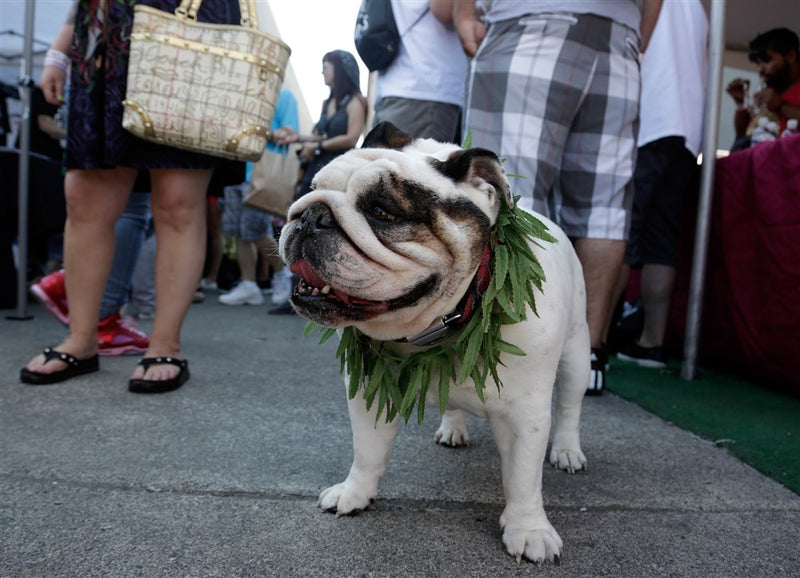- Regular
- $19.99
- Sale
- $19.99
- Regular
- $19.99
- Unit Price
- per
EFFECTIVE JAN 31, 2025, WE WILL NO LONGER SHIP TO CANADA & AUSTRALIA.

A great article published by NBC news. We actually didn't know this was an issue, but it makes sense.
This is your dog on drugs: Marijuana poisoning on the rise in pets
WRITTEN BY BRIAN ALEXANDER NBC NEWS
Please don’t let your dog drink the bong water.
Calls reporting pet poisonings by marijuana have increased by about 30 percent since 2009, from 213 calls that year to 320 in 2013, according to the Animal Poison Control Center, a division of the American Society for the Prevention of Cruelty to Animals.
Those calls probably represent only a fraction of poisonings related to cannabis.
In Boulder, Colo., where marijuana recently became legal, Dr. Matt Booth said his veterinary emergency center sees about a case a month. The episodes are usually accidental, he said, but even if some were deliberate, “and some ding-a-ling gave his dog marijuana, they wouldn’t tell me that” because of local animal cruelty laws.
Dr. Monica Kaeble of the Pet Emergency and Specialty Care Center in La Mesa, Calif., adjacent to San Diego, told NBCNews.com her practice sees more, about one or two cases of cannabis poisonings per week.
Marijuana doesn’t agree with dogs — and though cats can also be poisoned by second-hand smoke, dogs seem more apt to root through their owners’ stashes.
“Animals don’t react the same way as humans,” explained Dr. Tina Wismer, director of the Animal Poison Control Center. “They may become sedated, act drunk and wobbly, but about 25 percent go the other way. They become agitated, have high heart rates, they’re in distress. Most dogs become incontinent. They stagger around dribbling urine everywhere.”
Blood pressure can soar. Without treatment, dogs can go into comas and die.
Bong water (yes, really) is only one way animals can access the active ingredients in marijuana. While dogs can, and do, eat plant material, including marijuana leaves, serious poisonings more often result from edibles prepared by owners for their own use.
Marijuana butter is especially dangerous. “People put weed and a stick of butter in a sauce pan and the fat soluble cannabinoids leech into the butter creating a much higher concentration of THC,” Wismer explained.
Users then make brownies or cookies with the butter, and dogs, being dogs, and loving brownies and cookies, may scarf them down when a pet owner isn’t looking.
In the case of brownies, that’s doubly dangerous. Chocolate, a heart and nervous system stimulant in dogs, is one of the leading causes of dog poisonings in the U.S. Last year, the ASPCA poison control center received 9,200 calls related to chocolate poisoning, dwarfing the number of calls for marijuana.
But cookies can be doubly dangerous, too, Booth said. He’s seen cases of dogs ingesting marijuana-laced raisin oatmeal cookies, but the real problem wasn’t so much the marijuana as the raisins, which can be toxic to dogs, causing kidney failure.
Other frequent poisonings involve human medications, pesticides, and ethylene glycol anti-freeze.
The increasing availability of marijuana due to legalizations may be one reason why pet poisonings have gone up.
A 2012 study in the Journal of Veterinary Emergency and Critical Care reported a correlation between a rise in dog pot poisonings and the increased number of medical marijuana cardholders, finding a fourfold increase in cases at two Colorado hospitals over six years.
But Booth thinks awareness has helped. He used to see more cases involving marijuana at Alpenglow Veterinary Specialty + Emergency Center before Colorado made recreational pot legal.
“As it’s become more commonplace in Boulder, and now with legalization, pet guardians have gotten pretty savvy. I see it less and less. If they haven’t had experience with it, then a friend has and word has gotten out. People are more conscientious and aware,” he said.
If your dog shows signs of wobbliness, incontinence, is hyper reactive to sound and sights, has seizures or signs of hyperthermia, you can call the ASPCA’s poison control center at (888) 426-4435, a local emergency animal hospital, or your usual vet.
Original Article found at: https://www.nbcnews.com/health/health-news/your-dog-drugs-marijuana-poisoning-rise-pets-flna2D11959080
Photo used from article
0 Item(s)